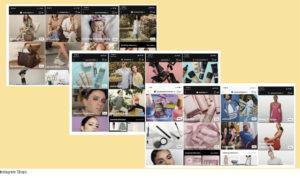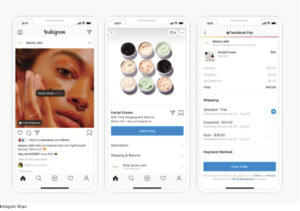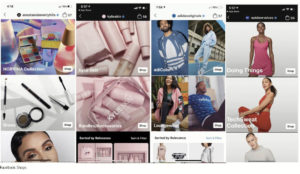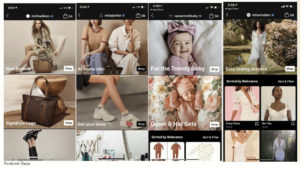As we all navigate the new normal we are living in, Morin Oluwole, Global Head of Luxury at Facebook discusses how technology and innovation can open up a whole new experience of opportunity during this time.

The world of social media is one of the few industries that has thrived throughout the global pandemic. Providing opportunities to connect with loved ones, as well as business connections and a platform that brand can use to elevate their communication during a time when physical interaction is difficult. While many companies are struggling this year, Facebook has excelled, developing new technologies under its wing and expanding the capabilities of its already forward-thinking platforms to exciting new realms. From Instagram to WhatsApp to Messenger which all part of the Facebook group, we have all come to rely on these entities and they have been an essential part of life throughout this difficult year.
But it’s not just on a personal level that social media can elevate the user experience. In the luxury world, Facebook is providing solutions for brands, allowing them to take their communication to the next level in new ways that are particularly effective in this era of digital communication. Leading the way with these developments is Morin Oluwole, Global Head of Luxury at Facebook. Morin’s role is to assist luxury brands in developing their global communications through Facebook’s platforms. This can be anything from producing branded filters on Instagram, to streaming a live fashion show through Facebook. As brands are looking to find new ways of communicating with their clients in this “new normal”, the role of luxury communication through social media has become more necessary than ever. We discuss with Morin Oluwole the ways her department is helping brands to elevate their reach and communication with customers during this time, as well as the latest technologies that are taking things to a whole new level.
This year has been a strange year for all – tell us a little about how Facebook has operated during the COVID-19 period?
It has indeed been quite a tough time and a tough global challenge and also a time where we must think about colleagues and employees of the company. As a company, we are currently still working from home and that is very likely to continue into next year. I would say that the approach of the company has been very much to provide and facilitate information and support people in this time of need. From a company point of view, Facebook has taken several actions, notably creating a COVID centre across all of our platforms where people can access the most accurate information regarding the crisis. From an employee point of view, it’s been important that people can address their personal lives and needs when it comes to managing the crisis. We have also made a company, over $100 million donation to support organisations that are working to help the current pandemic as well as supporting businesses that are in need.
From a business point of view, our Modus Operandi has been about being there and being present for our partners. Making sure that our approach is not only a commercial one but also very much about how we can help support them in any way possible. How we can support their teams, knowing that many companies are going through challenges and making sure that from a partnership point of view, we continue to be very present for them.

Instagram Shops
How do you think technology and social media in particular has helped people throughout this period?
In addition to the concrete actions that we’ve taken, we’ve also looked at how we address product development and make sure that we are able to have the right tools and places for people to connect, especially because many people are away from their loved ones during this time. When it comes to product innovation, for example, we’ve seen that video calls have increased by around 70 per cent as people are using Messenger and especially What’s App to connect with their families around the world. And so we have made some changes there, for example increasing the number of people you can have on group calls. We have created Messenger Rooms, where users can have live chats with people in their network to foster that connection with people.
How do you think social media has enabled the luxury world to continue with business during this time?
Consumer behaviour, especially when it comes to e-commerce has completely evolved and much more rapidly than anyone could have imagined. A recent report by McKinsey reported that we have seen three years of progress in just three weeks. Contentsquare has shared that there has been an increase of 100 per cent of purchases of luxury items via e-commerce versus before the crisis. So we see people are shopping more and more online and this presents an opportunity for the sector that maybe would have taken more time for businesses to address the e-commerce opportunities. Businesses are addressing what is the best way for them to engage with their consumer, while still maintaining a sophisticated and high-end experience. That could be with digital activations like how to best translate a fashion show online, how to best create or transform the in-store experience so customers can remain connected with their clients, and of course from an e-commerce point of view, making sure the flow is seamless and still representative of the brand.
What are some of the biggest challenges you are facing now as a company?
The priority as a company was to make sure that our employees were safe and that is still the most important aspect that the company has addressed. Now the question is how to ensure that we’re still able to work and communicate as effectively as possible through the crisis when we’re not able to physically see each other, and how do we stay close to our partners? We are ensuring that even though we might be on Zoom and communicating differently, that we are still able to foster these relationships with our partners. There has been very much a notion of empathy and support in the communities that need them most, especially in the context of racial and social justice. Also making sure that we’re able to build a secure and safe experience when it comes to Instagram and Facebook.
Going back to e-commerce, we know that more and more people are registering online, but the question is how to create innovation that supports this activity – how to create virtual showrooms, take advantage of Live experiences or even using virtual reality to be able to bring people into this storytelling experience, giving that the experience may not be the same as we have known it to be in the past.

Instagram Shops
What is the main goal you are focusing on for the remainder of 2020?
The good thing is that as a company our priorities haven’t changed that much because we are very much going in the direction that we were going in before the crisis. For quite some time now, the key strategy has been commerce. How we address commerce and make it easier for all kinds of businesses to be able to plug into this serendipitous experience that people have on our platforms. When you think about Instagram for example, we first launched Instagram Shops this summer, which allows brands to be able to create an immersive and customised experience. You can even go as far as integrating payment systems to allow customers to purchase directly from the platform. This has launched in the US and will hopefully soon launch around the world. Parallel to that is Messenger and how it can create stronger links between consumers and brands, especially when it comes to the new realms of experience. One brand that comes to mind is IWC who created a “bot” on Messenger for the launch of their latest watch and their objective was to be able to not just showcase this new watch, but also to allow people to reserve their appointments in the boutique through a Messenger experience. So you go from this storytelling experience to actually bringing the customer into an in-store experience.
What do you think sets some brands apart from others in the ways they use technology and what do you think is the secret to being successful moving forward?
Resilience and agility. Agility of course has been critical since the beginning and especially this year. It concerns being able to adapt to the circumstance while still retaining a strong brand point of view and not sacrificing the brand message and heritage. So when you think about agility, we need new ways of communicating that allow brands to connect with consumers, while still retaining that rich history and heritage. I talked already about Shops, and we’ve also just launched Reels, which is a new functionality on Instagram that permits brands to create authentic home videos, and we’ve had very strong feedback on this so far, especially when it comes to the creative community. Creators and brands have been testing Reels to see how they can engage with consumers and we are very excited as we continue to evolve it. We just announced that Reels would now have the option to create 30-second duration videos as well as 15-second videos, which will give more space for creativity. Louis Vuitton was one of the first to test Reels and it’s been great because the luxury world is understanding that it can create things in a very light yet authentic manner, without losing the essence of who they are as a brand.
Last time we talked you shared with us some of the AI applications you were working on for luxury brands, particularly with Instagram – how has this progressed and can you share anymore on how new technology is enhancing the customer experience with luxury brands?
When it comes to artificial intelligence, filters are still a great way for brands to communicate creatively and to be able to allow people to engage in an interactive way with the brand. It’s very early, but we are working on an AI assistant function that will recommend your outfit and accessories and help you find the perfect combination. This is some of the work that is being done by the Facebook AI researchers and one of the projects is to work out how to make new style recommendations and options to make outfits more fashionable. This is called Fashion++ and we are doing a lot of research in this segment at the moment. It’s still in the very early stages and of course, it’s important to be sure that the impact is positive and it works effectively before it is out in the public domain. So we are doing a lot of work to build more futuristic tools that are also very practical when it comes to life and the fashion and luxury world.

Facebook Shops
What is the process you go through when a brand comes to you looking for solutions?
It’s critical that when brands invest with us that we are able to drive value for themselves. Our approach with every single one of our partners is customised. This is key to allowing us to make sure we can address their business and consumer needs. We aim to take advantage of the fact that yes, we are a technology company, but we are also a company that provides tools that brands can use to support their businesses. We have resources at our disposal from our Creative Shop team, which allows us to help brands best translate their messages digitally. The world is becoming more technical and we can advise brands how best to be the most efficient when it comes to media. For innovation, we work very closely with our product teams and luxury brands are often the first ones to go to market with our new innovations, like Shops and Reels. The approach is very much customer depending on what the brand is looking for.
What can you tell us about Facebook for luxury in the Middle East? Our approach when it comes to building on our luxury support teams is that we have been very much focused on making sure that we can address different market needs. We started the team with just two people in early 2015 and we have worked on building a practice that is able to respect the codes of luxury. Over the years we have grown our teams in our key markets including in our Dubai office who work with our partners in markets. What’s important is that all of our teams align so we have a global brand strategy but each market can adapt that locally. When it comes to creating content, for example, we’ve had brands like Cartier who have adapted their creative to the Middle East market and we are able to have very close alignments and inputs with this, working with our global partners, making sure that they can address if needed, their audiences in a more relevant way.
This issue we are talking about success – how would you define success?
There is a Japanese philosophy that aligns the different aspects of success. The first part is professional success, being passionate about what one does, being able to make a living out of the way one lives and also, having an impact on the world. And so if you think about these different aspects, having the balance of these things is the secret to success. It can be very difficult to balance these, but personal fulfilment has to be part of success. Success on paper is great, but if it doesn’t drive your passions you can never have true success.
How do you think Facebook can help enhance or speed up success for businesses in the luxury sector?
We’ve done a lot of work in this sector specifically related to diversity and inclusion. This is a topic that’s very important for the company and we are very focused on the ways that we help and support business owners around this aspect. From making donations to support small businesses especially during this crisis and also using our tools and platforms to respond to the needs of these businesses. When we look at some of our functionalities like Shops; there are very concrete ways for companies to talk to people who can’t come into the physical stores to engage with the customers.
With success comes setbacks or failures – in your line of work how do you deal with failures and stay motivated?
The most important aspect is asking what we learnt from that setback. Asking why didn’t it work? One of the posters that we had in the office read “Fail Harder”. I find this very relevant. It means that failure is actually accepted and welcomed because it helps us to be better and to improve on what it is we’re working on. There have been many projects that have not worked but they have allowed us to build on the next one.

Facebook Shops
What would you still like to achieve in your role that you haven’t been able to do yet?
Right now, we have a very big opportunity that we’re still addressing because no one knows what the future is going to look like. Making sure that we are the number one partners and that we truly drive value for our partners is key. That value can come in different ways, it can be brand equity for example. We have a new objective to figure out how to create the most luxurious online experience that you can imagine. And I do believe that it is critical to create a seamless experience when it comes to the in-store and online experience. We have made a lot of different advances and there is a huge opportunity that’s still yet to be tapped into.
What do you think is something positive that will come from this period?
We had a reality that we thought was going to be the same forever and now the realisation is that things can change and have changed overnight. So the opportunity arises from who is best positioned to be able to adapt and be agile in this ever-changing world. That’s what’s going to be most important moving forward and that’s where the opportunities will come.
If you could look back, what is something that you would tell your younger self?
Stop doubting your talent. You are going to achieve and really become a force. I think this is something that we all work on, daily and personally; my experience has been very culturally led. I was born in Nigeria and I lived in London and the US before coming to Paris and when you are a black woman and you don’t see examples of people who have been successful ahead of you, it’s, unfortunately, easier to doubt whether you can achieve this level of success. Not just professionally, but personally as well. I take this responsibility very seriously and I discuss and engage with a lot of young women who are trying to figure out what their path is going to be and try to help guide them and allow them to learn from my experiences.
What’s the best piece of advice you’ve ever been given?
It’s not something that was given to me personally but I believe the best quote that has inspired me was by Mark Twain who said: “They didn’t know it was impossible, so they did it.” I think this is important because when you set limits for yourself or you are blocked by the ideas that things are not feasible, that is one of the factors to failure. So knowing that the impossible can happen is the key.
What is the professional that motto you live by?
It’s absolutely critical to focus on people first.















